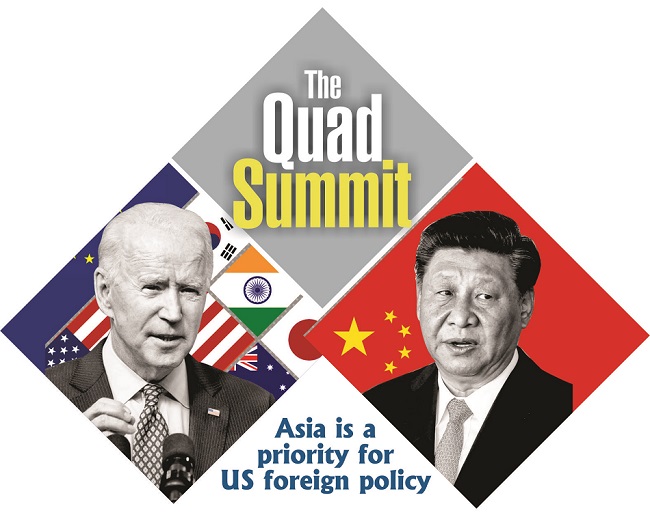The Quad Summit
The leaders of the Australia-India-Japan-United States alliance, the Quadrilateral Security Dialogue (or Quad) met on March 12 in a virtual summit as the Biden administration seeks to make good on its commitment to multilateralism, as well as sending China a signal of unity among the regional powers. The Quad summit and the joint statement issued at its conclusion mark a significant milestone in the evolution of the grouping, its agenda now clearer and likely to be received positively across the Indo-Pacific. The meeting is yet another event that clearly shows that the United States perceives China as the most significant rival to its hegemony. This is why America’s policy toward China remains the same irrespective of the party occupying the White House.
 Since assuming office in January, US President Joe Biden has enthusiastically embraced the “free and open Indo-Pacific” nomenclature favoured by his predecessor Donald Trump, contrary to apprehensions that he would seek to adopt a softer line toward China with the downstream effect that the Indo-Pacific construct would lose salience for the new administration. To the contrary, Sullivan affirmed the “centrality of the Indo-Pacific in US national security” for Biden administration in post-summit press briefing.
Since assuming office in January, US President Joe Biden has enthusiastically embraced the “free and open Indo-Pacific” nomenclature favoured by his predecessor Donald Trump, contrary to apprehensions that he would seek to adopt a softer line toward China with the downstream effect that the Indo-Pacific construct would lose salience for the new administration. To the contrary, Sullivan affirmed the “centrality of the Indo-Pacific in US national security” for Biden administration in post-summit press briefing.
The Biden administration has also sought to promote the Quad as a key component in the US Indo-Pacific strategy almost immediately since it took over, with both emerging as rare points of policy convergence between Biden and Trump, with Biden noting “[t]he Quad is going to be a vital arena for cooperation in the Indo-Pacific,” in the March 12 summit. In turn, in his own opening remarks at the March 12 summit (March 13 in Australia), Indian Prime Minister Narendra Modi thanked Biden for his initiative in holding the summit, confirming news reports as well as a March 5 statement by Australian Prime Minister Scott Morrison to that effect.
However, Biden seeks to leave his own distinct, pragmatic, imprint on the Quad, with a focus on the grouping’s “softer” capabilities in line with Indo-Pacific public-good needs rather than promote a singular counter-China orientation for the grouping. In any event, such a monomaniacal thrust would have had uncertain buy-in from India, not to mention from the 10-nation ASEAN whose “centrality” has become a defining proposition in the Quad’s public billing.
Analysts were hopeful that the Biden administration would adopt the path of reconciliation and smoothen the strained relations with China. However, the Quad Summit shatters all hopes of pacification. The joint statement issued emphasised security challenges, taking precedence amongst all the issues discussed in the security dialogue. Even though China was not named, reading between the lines suggests that the Quad’s call for a free, open, inclusive and healthy Indo-Pacific region anchored by democratic values and unconstrained by coercion was a direct shot at China.
Washington perceives Beijing as a threat to its strategic and economic interests in the Indo-Pacific region. Resultantly, the US military’s support for New Delhi will grow in the attempts to make India a counterbalancing power against China. The Quad’s agenda on critical technologies, especially member countries gearing for greater cooperation in cyberspace and navigation, rings alarm bells for Beijing, Islamabad and any other state interested in peace and mutual development in the region.
The security dialogue contained both broad substance and deep symbolism. Biden’s early push for the Quad engagement must be seen as part of his promise to restore America’s global leadership and reaffirm regional alliances that went sore during Trump’s presidency. Ultimately, like his predecessor, Biden has also chosen the path of confrontation vis-à-vis China.
The Quad needs to evolve from a China-focused club of four to a more development-oriented programme. Furthermore, the members, in their efforts to “democratise the region” will only cause more strife, especially now that India has come out openly against Beijing in the virtual meeting. This makes it essential for players like Pakistan, China and Russia to watch these new developments closely and shore up alliances where possible.
 Jahangir's World Times First Comprehensive Magazine for students/teachers of competitive exams and general readers as well.
Jahangir's World Times First Comprehensive Magazine for students/teachers of competitive exams and general readers as well.



